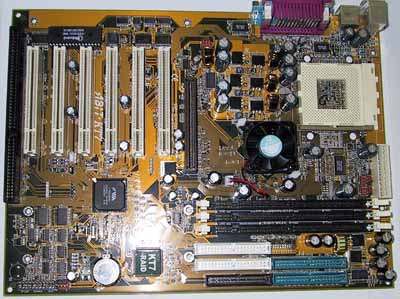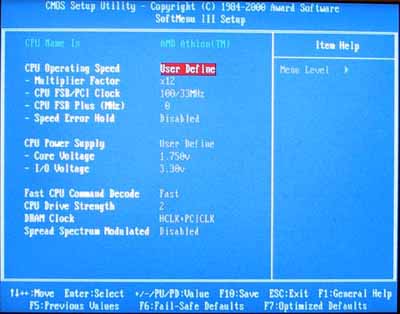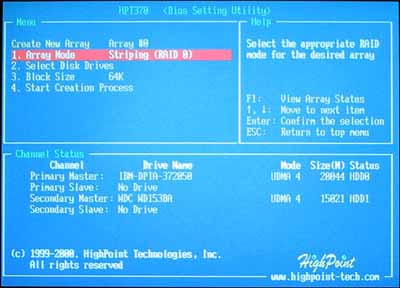Socket-A VIA KT133 Motherboard Roundup - November 2000
by Henry Kuo on November 30, 2000 5:15 AM EST- Posted in
- Motherboards
ABIT KT7-RAID
|
ABIT KT7-RAID |
|
|
CPU Interface
|
Socket-A
|
|
Chipset
|
VIA KT133
|
|
Form Factor
|
ATX
|
|
Bus Speeds
|
100
- 183MHz (1MHz increments)
|
|
Voltages Supported
|
1.30 - 1.85V in 0.025V increments
|
|
Memory Slots
|
3 168-pin DIMM Slots
|
|
Expansion Slots
|
1 AGP Slot
6 PCI Slots (4 Full Length) 1 ISA Slot (Shared) |
|
On-board Audio
|
N/A
|
|
BIOS
|
Award Modular BIOS 6.00PG
ABIT SoftMenu III |
The ABIT KT7-RAID was the winner in our Socket-A roundup back in August. At that time, there were only a handful of KT133 solutions out there that could truly satisfy all hardware enthusiasts.
Not only was ABIT one of the three manufacturers able to implement multiplier control on the motherboard, but they were also the only manufacturer that implemented that control in a jumperless fashion. ABIT did that by using their famous SoftMenu III Jumperless CPU Setup, where users are allowed to change the multiplier settings of the processors (provided that the CPU was unlocked) between x5 and x12.5 all within the confines of their BIOS setup.
Also from within the SoftMenu setup, users can choose from a wide range of FSB speed settings, between 100MHz and 183MHz in 1MHz increments. Practically, FSB speeds higher than 115MHz are not that useful, as the KT133 chipset cannot maintain much stability at those levels, but the 1MHz increments do allow users to extract every last ounce of performance from their setups. To complete the overclocking package, ABIT also threw in the ability to adjust the CPU core I/O voltage settings.
Even by today’s standards the overclocking ability of the KT7-RAID is still considered nearly perfect. The KT7-RAID is one of only two manufacturers that can boast a fully jumperless CPU setup.
The other impressive feature of the KT7-RAID is the on-board Highpoint HPT 370 IDE RAID controller. If you look around, there are a couple of KT133 solutions out there with on-board RAID controllers but the KT7-RAID was definitely one of the first. The HPT 370 controller supports two IDE channels (up to four Ultra ATA 100 devices), and users can either use that as a second IDE controller, or implement several RAID functions (RAID 0, RAID 1, and RAID 0+1).
The 6 PCI and 1 ISA expansion slot configuration is also a plus for most users. The decision of not using any AMR or CNR slots clearly shows that ABIT does not target the OEM market, however to their credit, very few OEMs have adopted either standard. Instead, ABIT put in an single ISA slot for users with old ISA devices.
The ABIT KT7-RAID is definitely a good board, particularly if you need RAID support or an ISA slot; the SoftMenu III setup doesn’t hurt either.













0 Comments
View All Comments